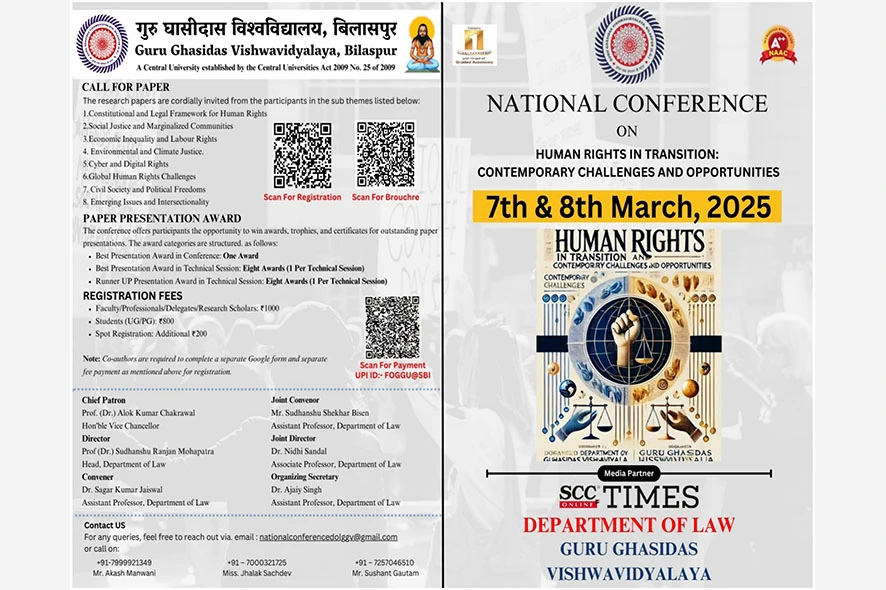I. About the GGV
Guru Ghasidas Vishwavidyalaya (GGV) is a premier Green Campus Central University located in Bilaspur, Chhattisgarh, established under the Central University Act 2009, No. 25 of 2009. The university is named after the revered saint Guru Ghasidas and guided by the Sanskrit motto “Gyan Panth Kripan kae Dhara” (The Path of Knowledge is the Flow of Grace). Furthermore, GGV is accredited with the prestigious NAAC A++ grade, indicating that an educational institution has received the highest level of accreditation based on various parameters such as infrastructure and teaching quality while fostering a vibrant learning environment and making it a centre for holistic growth.
II. About the Conference
Human rights are the bedrock of any democratic society, especially in Countries such as India, where their protection and promotion of these rights face numerous challenges stemming from social, economic, political, and technological transformations. This conference aims to critically analyse the state of human rights in India while addressing major challenges like caste discrimination, gender violence, and digital surveillance and also explore opportunities for strengthening the human rights framework through policy reforms and legal amendments.
III. Call for Paper
We cordially invite Academicians, Legal Professionals, Policymakers, Scholars/Researchers, Students, Member of Civil Society, Human Rights Activist, and Government Officials to contribute their stake and present a paper for National Conference. The Conference will feature technical sessions addressing various sub-themes listed below:
|
1. Constitutional and Legal Framework for Human Rights |
1. The Constitutional Protection of Human Rights: Challenges and Opportunities |
|
3. Custodial Violence and Criminal Justice Reforms |
|
|
5. Judicial Activism and Its Role in Promoting Human Rights |
|
|
2. Social Justice and Marginalized Communities |
|
|
7. Tribal Communities: Displacement, Land Rights, and Cultural Survival |
|
|
9. Rights of the LGBTQ+ Community: Progress and Challenges |
|
|
3. Economic Inequality and Labour Rights |
11. Economic Inequality: Impact on Access to Human Rights |
|
13. The Unorganized Sector: Labour Rights and Exploitation |
|
|
15. Challenges in Enforcing Minimum Wage Laws |
|
|
4. Environmental and Climate Justice |
|
|
17. The Right to a Healthy Environment: Integrating Human Rights and Environmental Laws |
|
|
19. Legal and Ethical Dimensions of Climate Refugees |
|
|
5. Cyber and Digital Rights |
21. Digital Privacy: Data Protection and Surveillance Challenges |
|
23. Artificial Intelligence and Human Rights: Ethical Considerations |
|
|
25. The Right to Internet Access as a Human Right |
|
|
6. Global Human Rights Challenges |
|
|
27. Human Trafficking and Forced Labour: Strengthening Legal Responses |
|
|
29. Post-conflict Rehabilitation and Justice Mechanisms |
|
|
7. Civil Society and Political Freedoms |
31. Shrinking Space for Political Dissent: Role of Civil Society |
|
33. Whistleblowers and the Protection of Democratic Values |
|
|
35. Citizen Movements and Grassroots Advocacy for Political Freedoms |
|
|
8. Emerging Issues and Intersectionality |
|
|
37. Intersectionality in Policy-making: Challenges and Opportunities |
|
|
39. Technology and Intersectional Disparities in Access to Rights |
|
IV. Submission Guidelines
Submissions should include:
-
An Abstract (250-300 words)
-
Language: English or Hindi
-
Software: Microsoft Word
-
Font: Times New Roman (English), Kruti Dev 10 or Kokila (Hindi)
-
Font Size:
-
Title: 14 pt, bold, uppercase
-
Author’s Name: 11 pt, italic, without prefixes
-
Abstract: 11 pt
-
Main Text: 12 pt
-
Footnotes: 10 pt
-
-
Line Spacing: 1.5 for main text; 1.0 for footnotes
-
Length: 3,500 to 6,000 words (including footnotes)
-
Citation: Follow ILI Rules for footnoting (https://ili.ac.in/cstyle.pdf) Manuscripts must be original and must include:
-
Educational qualifications, designation/professional status, university/organization name, and email ID in the footnotes on the first page.
-
Keywords (maximum 5 words)
-
Divisions into headings, with Introduction and Conclusion sections.
-
Manuscript shall be E-mail at: nationalconferencedolggv@gmail.com
Note: Participants are requested to adhere strictly to the above guidelines.
V. Further Details of the Session
-
Last date of Registration : 22 Feb, 2024
-
Last date of abstract Submission : 25 Feb, 2025
-
Full Paper Submission: 05 March, 2025
-
Conference Date : 07th & 08th March, 2025
-
Mode — Hybrid (both Online and Offline)
-
Registration Form – https://forms.gle/upXaTgKNezS2kbRR6
-
Registration fees :
-
Faculty/Professionals/Delegates/Research Scholars: ₹1000
-
Students (UG/PG): ₹800
-
Spot Registration: Additional ₹200
-
-
Brochure Link – https://www.new.ggu.ac.in/attachments/attachments/events/Brochure_National_Conference_on_Human_Rights_Law_29.01.25.pdf
VI. Contact Details
-
For any queries, feel free to reach out via. email : nationalconferencedolggv@gmail.com or call on:
Address: Department of Law, Guru Ghasidas Vishwavidyalaya, Koni, Bilaspur, Chhattisgarh, India, Pin- 495009






